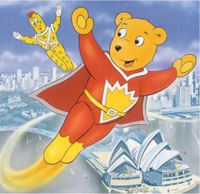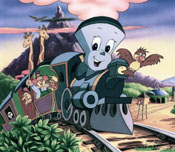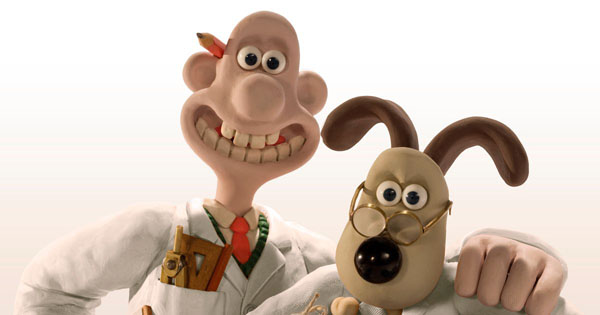 Siriol Animation. Dave Edwards established the animation studio Siriol (the Welsh word for “cheery”) in 1982 in Cardiff, Wales with Mike Young to produce the Super Ted series. At one point there was a touring musical stage show about the character. Edwards said, “It had lasers, a stage which opened up, lavish dance numbers. It was all very sophisticated. It toured but didn’t make it to London.”
Siriol Animation. Dave Edwards established the animation studio Siriol (the Welsh word for “cheery”) in 1982 in Cardiff, Wales with Mike Young to produce the Super Ted series. At one point there was a touring musical stage show about the character. Edwards said, “It had lasers, a stage which opened up, lavish dance numbers. It was all very sophisticated. It toured but didn’t make it to London.”
Young left the company in 1989 to move to America and set up his own production studio. In 1991, Edwards produced and directed the thirty minute The Little Engine That Could for Universal/MCA. However to do so, he had to make a difficult choice. Disney wanted to buy him out.
“It was a choice between working for Disney and going on with Little Engine,” said Edwards. “Everyone who works here admires Disney. It was right for them to have their say. I took my staff of twelve out to lunch and called for a vote. All but one opted for Siriol staying independent.
 “I loved films and cartoons from an early age. We went to the cinema a lot. Disney was all I really knew when it came to cartoons. In the early years as an animator (including working of Yellow Submarine and commercials), I declined jobs with Disney and Hanna-Barbera.”
“I loved films and cartoons from an early age. We went to the cinema a lot. Disney was all I really knew when it came to cartoons. In the early years as an animator (including working of Yellow Submarine and commercials), I declined jobs with Disney and Hanna-Barbera.”
In 1991, Edwards and Siriol were working on Hot Dog (a futuristic West Side Story style cartoon series featuring motorized cats and dogs), The Radio Adventures of J.P. Jones (a boy dreams he is the hero of dramatic news bulletins he hears on his radio), a series of six Shakespeare adaptations with Soviet animation studio Soyuzmultfilm and The Old Man of Lochnager (based on a story by Prince Charles).
“When I met the Prince at Highgrove, I expected formality. But he was doing Goon impressions, and an accent for the book’s Scottish characters,” said Edwards. “It was more fun than I thought. I immediately offered him to do a character voice for the film.” Prince Charles ended up doing the narration.

Nick Park. In The Sunday Times (U.K.) November 23rd, 1997, animator Nick Park said, “When I see someone else modeling Gromit, I get this desire to change it. And if someone asks me what was wrong, I can’t really say. It’s something I can only feel when I’ve got it in my hands. I just know and can’t explain. I have always tried to find my identity in animation. I think I’ve always had low self-esteem and animation is the one thing that has supported me. With film you feel very vulnerable. It’s very scary, really scary.
“Even when I was very small, I used to dream of one day creating characters. Once, I saw a Disney film and I used to dream that one day my characters might be up there. I do like making characters who are enduring and cute – although cute is not the right word for it – but at the same time mixing it with this sort of mischievous evil. There was something about Peter Sallis’ voice that somehow insisted I make Wallace’s mouth really wide to get it around the syllables.”
 Tony Bancroft on Mulan. In USA Today in 1998, co-director of Mulan Tony Bancroft said about the film, “We know we can’t please all of China. But we were respectful of the material. My daughters (then aged two and a half and four and a half) love the Disney princesses but what I would like them to see is a girl deciding on her own path in life. I also like the notion of a child sacrificing for a parent.”
Tony Bancroft on Mulan. In USA Today in 1998, co-director of Mulan Tony Bancroft said about the film, “We know we can’t please all of China. But we were respectful of the material. My daughters (then aged two and a half and four and a half) love the Disney princesses but what I would like them to see is a girl deciding on her own path in life. I also like the notion of a child sacrificing for a parent.”
Mark Henn on Mulan. In Newsweek June 8, 1998 animator Mark Henn, designer of Mulan (1998), said, “We (Disney) have been criticized for making female characters quite buxom and I knew going in that wasn’t going to be Mulan. Mulan is healthy and athletic in a normal way. Ming (Na Wen, the voice of Mulan) is very animated, pardon the pun. It freed me to push Mulan. I wanted more than just the Clark Kent syndrome.
“I had to slightly change her physically. It helped that pulling her hair up exposed her ears which stick out. We wanted the toymakers to base the figure on a less curvy version of Barbie by using her friend Midge as a guide.”
Convulsive Animation. From the Daily Press (Newport News) April 1st, 1998, it was not an April Fool’s joke but the Pokemon animated television series was taken off the air in December because at least 700 viewers were taken to hospitals, many in convulsions. The December sixth episode feaured a few seconds of rhythmic strobe-like flashes of blue, red and white, each about one-thirtieth of a second long.
Reactions to it included nausea, hyperventilation and loss of consciousness. Researchers say the flashing lights might have simply overexcited some of the children. In other cases, however, the lights might have acted directly on the brain, causing convulsions by disrupting the natural pacemakers that regulate normal brain patterns. TV Tokyo brought back the series April 16th but with new restrictions that limited the use of flashing lights, moving stripes and the color red in its children’s shows.
American Pop. From the New York Times March 27, 1998, producer and animator Ralph Bakshi talked about why clearing music rights took so long delaying the release of his animated feature film American Pop (1981) from appearing on video. “I got all this music that wasn’t being used that much (in 1981),” said Bakshi. “Dylan even allowed one of the character in the film to write the song (A Hard Rain’s Gonna Fall) and take credit for it. It cost only about a thousand to two thousand dollars a song. Relatively little fuss was made over the rights. There was a meeting at Columbia and this lawyer said, ‘Look, we have all this music and for an extra $1,500 a song we can have all the rights in perpetuity. Then someone else said, ‘What do we need that for?’
“When we tried to issue the film on home video, every song was at least $50,000. Columbia wanted me to change all the music, do remakes of everything and I said ‘no’ and the film was shelved. Now animation is the darling of Hollywood and we went to the music division and asked what it would cost to clear the film for video. The number was staggering. When Heavy Metal (1981) was released with its rock music and they had such success with that film, this one began to look like a gamble worth taking.”


 Jim Korkis is an internationally respected animation historian who in recent years has devoted his attention to the many worlds of Disney. He was a columnist for a variety of animation magazines. With his former writing partner, John Cawley, he authored several animation related books including The Encyclopedia of Cartoon Superstars, How to Create Animation, Cartoon Confidential and Get Animated’s Animation Art Buyer’s Guide. He taught animation classes at the Disney Institute in Florida as well as instructing classes on acting and animation history for Disney Feature Animation: Florida.
Jim Korkis is an internationally respected animation historian who in recent years has devoted his attention to the many worlds of Disney. He was a columnist for a variety of animation magazines. With his former writing partner, John Cawley, he authored several animation related books including The Encyclopedia of Cartoon Superstars, How to Create Animation, Cartoon Confidential and Get Animated’s Animation Art Buyer’s Guide. He taught animation classes at the Disney Institute in Florida as well as instructing classes on acting and animation history for Disney Feature Animation: Florida.




















































I was one of the rare few in Louisiana who knew of Siriol’s work, but didn’t know who they were.
Growing up in the 80’s, I had The Disney Channel back when you had to pay extra to receive it, and could watch Siriol’s “SuperTed” series when they played those shorts in the mid 80’s. Of course anyone who watched SuperTed knows of it’s fabulous theme song, which is still stuck in my head to this very day!
https://www.youtube.com/watch?v=fQctqtAP44c
Regarding this quote of Nick Park: “I do like making characters who are enduring and cute…”
I strongly suspect the word Park was actually saying here was ENDEARING, not enduring. Not sure if the spelling error was in the article or what.
Yes, that word “enduring” was in the quote from Park. Also, when he says “cute” is not the right word, I THINK he may have been searching for the word “appealing”, a term often used at Disney during the Golden Age.
That’s not what I meant, Jim. I meant to say that Park very likely said “endearing” while being interviewed — and that the article writer either misheard or mistyped the word for the published article.
Wow. I never realized clearing rights in the case of certain movies and TV shows would be so difficult. No wonder Muppet Babies and Alvin and the Chipmunks (the 1983 series) still haven’t gotten complete series DVD releases. On the other hand, if The Wonder Years was able to get nearly all the music rights cleared for its release on DVD, I don’t see any reason why the same can’t be done for the former two. I even see Shout Factory as a perfect fit to release them, given that they’re good at clearing rights issues.
Shout Factory ISN’T always so hot with getting music clearance rights… I have a Red Skelton Show DVD set they released a couple of years ago, and to my surprise they replaced all of the original David Rose “Holiday for Strings” theme music with a strange unknown banjo-plucking instrumental.
Music rights (and probably character use rights for Superman, Wonder Woman and The Lone Ranger) are probably what kept The Brady Kids cartoon off of DVD shelves for years (although that may not have been a big loss to anyone besides Brady Bunch completists).